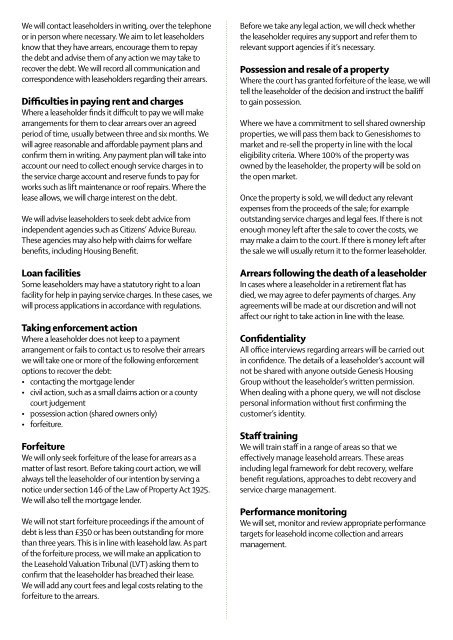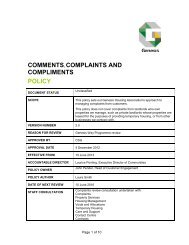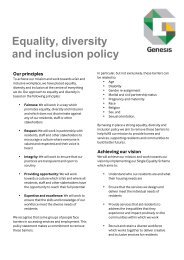Leasehold arrears - Genesis Housing Association
Leasehold arrears - Genesis Housing Association
Leasehold arrears - Genesis Housing Association
Create successful ePaper yourself
Turn your PDF publications into a flip-book with our unique Google optimized e-Paper software.
We will contact leaseholders in writing, over the telephone<br />
or in person where necessary. We aim to let leaseholders<br />
know that they have <strong>arrears</strong>, encourage them to repay<br />
the debt and advise them of any action we may take to<br />
recover the debt. We will record all communication and<br />
correspondence with leaseholders regarding their <strong>arrears</strong>.<br />
Difficulties in paying rent and charges<br />
Where a leaseholder finds it difficult to pay we will make<br />
arrangements for them to clear <strong>arrears</strong> over an agreed<br />
period of time, usually between three and six months. We<br />
will agree reasonable and affordable payment plans and<br />
confirm them in writing. Any payment plan will take into<br />
account our need to collect enough service charges in to<br />
the service charge account and reserve funds to pay for<br />
works such as lift maintenance or roof repairs. Where the<br />
lease allows, we will charge interest on the debt.<br />
We will advise leaseholders to seek debt advice from<br />
independent agencies such as Citizens’ Advice Bureau.<br />
These agencies may also help with claims for welfare<br />
benefits, including <strong>Housing</strong> Benefit.<br />
Loan facilities<br />
Some leaseholders may have a statutory right to a loan<br />
facility for help in paying service charges. In these cases, we<br />
will process applications in accordance with regulations.<br />
Taking enforcement action<br />
Where a leaseholder does not keep to a payment<br />
arrangement or fails to contact us to resolve their <strong>arrears</strong><br />
we will take one or more of the following enforcement<br />
options to recover the debt:<br />
• contacting the mortgage lender<br />
• civil action, such as a small claims action or a county<br />
court judgement<br />
• possession action (shared owners only)<br />
• forfeiture.<br />
Forfeiture<br />
We will only seek forfeiture of the lease for <strong>arrears</strong> as a<br />
matter of last resort. Before taking court action, we will<br />
always tell the leaseholder of our intention by serving a<br />
notice under section 146 of the Law of Property Act 1925.<br />
We will also tell the mortgage lender.<br />
We will not start forfeiture proceedings if the amount of<br />
debt is less than £350 or has been outstanding for more<br />
than three years. This is in line with leasehold law. As part<br />
of the forfeiture process, we will make an application to<br />
the <strong>Leasehold</strong> Valuation Tribunal (LVT) asking them to<br />
confirm that the leaseholder has breached their lease.<br />
We will add any court fees and legal costs relating to the<br />
forfeiture to the <strong>arrears</strong>.<br />
Before we take any legal action, we will check whether<br />
the leaseholder requires any support and refer them to<br />
relevant support agencies if it’s necessary.<br />
Possession and resale of a property<br />
Where the court has granted forfeiture of the lease, we will<br />
tell the leaseholder of the decision and instruct the bailiff<br />
to gain possession.<br />
Where we have a commitment to sell shared ownership<br />
properties, we will pass them back to <strong>Genesis</strong>homes to<br />
market and re-sell the property in line with the local<br />
eligibility criteria. Where 100% of the property was<br />
owned by the leaseholder, the property will be sold on<br />
the open market.<br />
Once the property is sold, we will deduct any relevant<br />
expenses from the proceeds of the sale; for example<br />
outstanding service charges and legal fees. If there is not<br />
enough money left after the sale to cover the costs, we<br />
may make a claim to the court. If there is money left after<br />
the sale we will usually return it to the former leaseholder.<br />
Arrears following the death of a leaseholder<br />
In cases where a leaseholder in a retirement flat has<br />
died, we may agree to defer payments of charges. Any<br />
agreements will be made at our discretion and will not<br />
affect our right to take action in line with the lease.<br />
Confidentiality<br />
All office interviews regarding <strong>arrears</strong> will be carried out<br />
in confidence. The details of a leaseholder’s account will<br />
not be shared with anyone outside <strong>Genesis</strong> <strong>Housing</strong><br />
Group without the leaseholder’s written permission.<br />
When dealing with a phone query, we will not disclose<br />
personal information without first confirming the<br />
customer’s identity.<br />
Staff training<br />
We will train staff in a range of areas so that we<br />
effectively manage leasehold <strong>arrears</strong>. These areas<br />
including legal framework for debt recovery, welfare<br />
benefit regulations, approaches to debt recovery and<br />
service charge management.<br />
Performance monitoring<br />
We will set, monitor and review appropriate performance<br />
targets for leasehold income collection and <strong>arrears</strong><br />
management.






